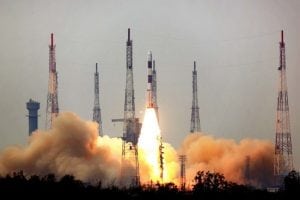COMSTAC Weighs Expanding US Access to India’s Launch Services
[Via Satellite 12-11-2015] The U.S. Federal Aviation Administration’s (FAA) Commercial Space Transportation Advisory Committee (COMSTAC) and its International Space Policy Working Group (ISPWG) are considering expanding access to India’s launch services to the U.S. market through the Indian Space Research Organization (ISRO) and its commercial arm, Antrix Corp. On Dec. 10, the group tabled a vote to recommend to the U.S. Trade Representative (USTR) to remove the waivers that satellite companies are currently required to obtain from the State Department and Department of Commerce for the export of satellites for launch to India.
Current legislation set in 2005 requires satellite companies to enter into an extra layer of government review in order to gain approval for the export on launch of satellites to India. The current legislation was intended to discourage the use of Indian launch vehicles by American launch companies John Sloan, space policy analyst and program lead for International Outreach at the FAA’s Office of Commercial Space Transportation explained during the meeting.
“The issue in the short term is high interest in the U.S. satellite community in getting access to satellite launch vehicles internationally, especially India for small satellites,” explained Sloan, during the Thursday meeting in which the group also passed a vote in support of the U.S. industry participation in European Space Agency’s (ESA) “lunar village” project.
Although not on a set timeline to provide a vote, when the group reconvenes in the near future, they will look to decide whether to recommend to the USTR to “keep current policy or allow a change to happen so satellite companies would not have to go through this extra hoop in order to get approval for export on launch of satellites to India,” according to Sloan.
India has been going after a larger share of the commercial launch market recently, and its Polar Satellite Launch Vehicle (PSVL) has proved its most successful rocket, launching a total of 84 satellites since 1994, 51 of which have been launched for customers outside of India, according to the ISRO’s website. Most recently, Colorado-based commercial weather company PlanetiQ, a start-up with plans to field a constellation of 12 small weather satellites, has inked an agreement with Antrix for the launch of the company’s first two spacecraft. But there is resistance from emerging domestic launch providers who are concerned about losing market share. Rich DalBello, vice president of business development and government affairs at Virgin Galactic believes India is targeting the small satellite class and, as a company that is soon to be a launch provider for small satellites, does not believe it is an appropriate time to expedite launches to companies outside of the U.S. marketplace.
“The administration, FAA, the COMSTAC, the United States Congress, have spent a lot of time trying to create a robust U.S. domestic launch industry. I think that that process, that work, is finally starting to bear fruit initially with the first generation of commercial launchers like SpaceX, and then we’ve got three or maybe four small satellite launchers coming along in the next 18 to 24 months. I think now is a uniquely bad time to say, ‘well there are just no launchers’ because the data doesn’t show that. Small satellites are finding their way to space, they are finding their way to space in record numbers,” said DalBello.
“We think there’s a process in place, we think the process today works, it’s a little bit slower, for sure, but it’s designed to continue to ask the question ‘what is the impact that this non-market economy is having on the commercial satellite industry?” he added.
The current COMSTAC proposal, at the time of the meeting, seemed to favor keeping the status quo and maintaining the need for government waivers to access Indian commercial launches.
“Our proposal is written that you keep it as a case-by-case basis and consider the impact of what each case does,” said COMSTAC Chair Livingston Holder Jr.
The working group delayed the vote to remove the waiver process for India in order to more adequately understand the current state-of-play as well as to determine how the change would specifically impact the current policy, which discourages the use of Indian launch vehicles by American companies.
